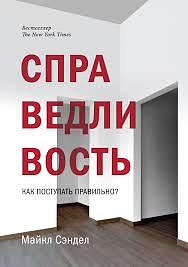You need to sign in or sign up before continuing.
Take a photo of a barcode or cover
challenging
hopeful
informative
inspiring
reflective
tense
medium-paced
challenging
informative
slow-paced
informative
challenging
informative
reflective
fast-paced
I'm not normally a consumer of books on ethical philosophy and "Justice" is no different. It was assigned to me as part of my Masters coursework. Despite picking it up out of obligation, I found substantial value in its pages.
"Justice" is a brief study of how we can derive justice from several different ethical viewpoints, including deontology, utilitarianism, virtue ethics, and more. It focuses on applications of ethical philosophy in politics and public administration, but it has applications far beyond those categories. I particularly enjoyed the chapters on deontology as I'm generally more a Kantian ethics guy than anything else. (Also, I find utilitarianism almost wholly without merit. What a crock!)
The last chapter was timely, despite having been published almost twenty years ago. Sandel ends by explaining how "public engagement with questions of the good life" is not a "civic transgression," but a necessary endeavor that may actually heal us more than we know. He says, "we've come to assume that respecting our fellow citizens' moral and religious convictions means ignoring them, leaving them undisturbed, and conducting our public life--insofar as possible--without reference to them. But this stance of avoidance can make for a spurious respect. Often, it means suppressing moral disagreement rather than actually avoiding it. This can provoke backlash and resentment. It can also make for an impoverished public discourse, lurching from one news cycle to the next, preoccupied with the scandalous, the sensational, and the trivial" (Sandel, p. 268). To this, I offer naught but wholehearted endorsement.
Have hard conversations with those that you love. Step up to the plate of controversy and take a swing. However, be aware that not every ball you hit will be a home run. Be prepared to be wrong and to have your views challenged. While genuine truth does exist, it is unlikely to blossom at first utterance. It is far more likely to emerge after well-intentioned discussion and debate. The path to consensus crosses the mountains and valleys of discomfort, my friends.
If you're interested in ethics, morality, and its effect on the public sphere, it's hard to imagine a better introduction than "Justice." Pick it up if you're interested in that sort of thing.
"Justice" is a brief study of how we can derive justice from several different ethical viewpoints, including deontology, utilitarianism, virtue ethics, and more. It focuses on applications of ethical philosophy in politics and public administration, but it has applications far beyond those categories. I particularly enjoyed the chapters on deontology as I'm generally more a Kantian ethics guy than anything else. (Also, I find utilitarianism almost wholly without merit. What a crock!)
The last chapter was timely, despite having been published almost twenty years ago. Sandel ends by explaining how "public engagement with questions of the good life" is not a "civic transgression," but a necessary endeavor that may actually heal us more than we know. He says, "we've come to assume that respecting our fellow citizens' moral and religious convictions means ignoring them, leaving them undisturbed, and conducting our public life--insofar as possible--without reference to them. But this stance of avoidance can make for a spurious respect. Often, it means suppressing moral disagreement rather than actually avoiding it. This can provoke backlash and resentment. It can also make for an impoverished public discourse, lurching from one news cycle to the next, preoccupied with the scandalous, the sensational, and the trivial" (Sandel, p. 268). To this, I offer naught but wholehearted endorsement.
Have hard conversations with those that you love. Step up to the plate of controversy and take a swing. However, be aware that not every ball you hit will be a home run. Be prepared to be wrong and to have your views challenged. While genuine truth does exist, it is unlikely to blossom at first utterance. It is far more likely to emerge after well-intentioned discussion and debate. The path to consensus crosses the mountains and valleys of discomfort, my friends.
If you're interested in ethics, morality, and its effect on the public sphere, it's hard to imagine a better introduction than "Justice." Pick it up if you're interested in that sort of thing.
Lo tuve que leer para clase, no lo disfruté mucho por leerlo obligada
challenging
informative
reflective
medium-paced
challenging
informative
inspiring
slow-paced
this book did an excellent job of answering one of the toughest questions that faces our society: what exactly is justice and how can we achieve it? sandel offers so many real-world examples that test utilitarian, libertarian, and more philosophical ideologies. yes, the terminology used was confusing, but this was really my first time being exposed to these new ideas-a second read through will likely benefit me from understanding everything. i would love to see how he writes this book one decade later and what would change, if anything, about it.
An interesting read about how to think about Justice. Sandel provides accounts of 3 ways to think about justice - to maximize welfare, respect freedom or promote virtue. The text also explores the ideas of Kant, Rawls and Aristotle and debates their ideas of justice and morality supported by examples from the real world.
After reading this piece, I know more about how to think of such difficult deliberations but at the same time, I'm more confused about what is the right thing to do. And that's the beauty of reading a philosophical text. You know more about how different proponents of morality thought about the right thing to do in their respective societies and then try to align it to your own moral compass.
What is clear to me is that there is no absolute way to think about morality and justice. It is relative to the society you live in and to a certain extent how broad you could think, how disconnected you can be from the physical world and look at such ideas from an objective point of view. As Kant said - there are two realms in which we live; the sensible and the rational. In the sensible realm, we are governed by the laws of nature and thus act as puppets while in the rational we act as agents of such laws. Now it begets a difficult question as to what those laws would be and what criteria should they be based on. This is where the debate and numerous ideas about morality, freedom and ultimately justice evolve from. None no stronger than the other.
After reading this piece, I know more about how to think of such difficult deliberations but at the same time, I'm more confused about what is the right thing to do. And that's the beauty of reading a philosophical text. You know more about how different proponents of morality thought about the right thing to do in their respective societies and then try to align it to your own moral compass.
What is clear to me is that there is no absolute way to think about morality and justice. It is relative to the society you live in and to a certain extent how broad you could think, how disconnected you can be from the physical world and look at such ideas from an objective point of view. As Kant said - there are two realms in which we live; the sensible and the rational. In the sensible realm, we are governed by the laws of nature and thus act as puppets while in the rational we act as agents of such laws. Now it begets a difficult question as to what those laws would be and what criteria should they be based on. This is where the debate and numerous ideas about morality, freedom and ultimately justice evolve from. None no stronger than the other.




